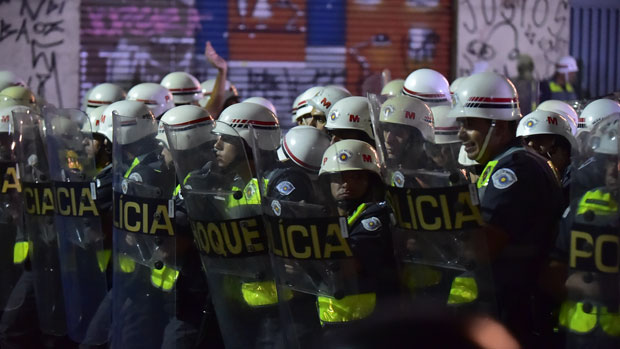Brazilian police strike weeks before World Cup begins
Police industrial action in Brazil raises safety fears as anti-World Cup protests escalate

A free daily email with the biggest news stories of the day – and the best features from TheWeek.com
You are now subscribed
Your newsletter sign-up was successful
Thousands of Brazilian police in 14 cities will strike over pay today, as street protests continue over the £10bn cost of hosting the World Cup, less than three weeks before the tournament kicks off.
The one-day strike by civil police affects several host cities including Sao Paolo, where the opening game of the tournament takes place on 12 June, and Rio de Janeiro. Officers are demanding a pay increase of up to 80 per cent.
Military and federal police, who deal with public order and more serious offences, say they also have grievances but will hold off strike action until after the World Cup, the BBC reports.
The Week
Escape your echo chamber. Get the facts behind the news, plus analysis from multiple perspectives.

Sign up for The Week's Free Newsletters
From our morning news briefing to a weekly Good News Newsletter, get the best of The Week delivered directly to your inbox.
From our morning news briefing to a weekly Good News Newsletter, get the best of The Week delivered directly to your inbox.
"There is no climate for a general [police] strike now in Rio de Janeiro," Roberto Alzir, Brazil's 'big events secretary', told the BBC.
The strike adds to the sense of unease stoked by waves of anti-World Cup protests. Last week 10,000 people took to the streets in six host cities to protest against the cost of staging matches, Sky News reports.
"What we want are more rights for workers to have access to housing and to show the effects the Cup had brought to the poor," Guilherme Boulos, head of the Homeless Workers' Movement explained.
Small demonstrations against a hike in transport fares spiralled into violent clashes between police and protesters, during which tyres were set alight and police fired rubber bullets and tear gas.
A free daily email with the biggest news stories of the day – and the best features from TheWeek.com
According to Amnesty International, the protests stem from poor public services, government corruption and forced evictions in communities surrounding some of the stadiums.
"Hosting the competition has cost the country more than it should, and in return is giving back less than it should," writes Tim Vickery of the BBC.
About 20,000 security personnel, including troops and military police, will be on duty during the tournament amid concerns over serious violence in Rio's more deprived neighbourhoods.
-
 The problem with diagnosing profound autism
The problem with diagnosing profound autismThe Explainer Experts are reconsidering the idea of autism as a spectrum, which could impact diagnoses and policy making for the condition
-
 What to know before filing your own taxes for the first time
What to know before filing your own taxes for the first timethe explainer Tackle this financial milestone with confidence
-
 The biggest box office flops of the 21st century
The biggest box office flops of the 21st centuryin depth Unnecessary remakes and turgid, expensive CGI-fests highlight this list of these most notorious box-office losers
-
 Epstein files topple law CEO, roil UK government
Epstein files topple law CEO, roil UK governmentSpeed Read Peter Mandelson, Britain’s former ambassador to the US, is caught up in the scandal
-
 Iran and US prepare to meet after skirmishes
Iran and US prepare to meet after skirmishesSpeed Read The incident comes amid heightened tensions in the Middle East
-
 Israel retrieves final hostage’s body from Gaza
Israel retrieves final hostage’s body from GazaSpeed Read The 24-year-old police officer was killed during the initial Hamas attack
-
 China’s Xi targets top general in growing purge
China’s Xi targets top general in growing purgeSpeed Read Zhang Youxia is being investigated over ‘grave violations’ of the law
-
 Panama and Canada are negotiating over a crucial copper mine
Panama and Canada are negotiating over a crucial copper mineIn the Spotlight Panama is set to make a final decision on the mine this summer
-
 Why Greenland’s natural resources are nearly impossible to mine
Why Greenland’s natural resources are nearly impossible to mineThe Explainer The country’s natural landscape makes the task extremely difficult
-
 Iran cuts internet as protests escalate
Iran cuts internet as protests escalateSpeed Reada Government buildings across the country have been set on fire
-
 US nabs ‘shadow’ tanker claimed by Russia
US nabs ‘shadow’ tanker claimed by RussiaSpeed Read The ship was one of two vessels seized by the US military